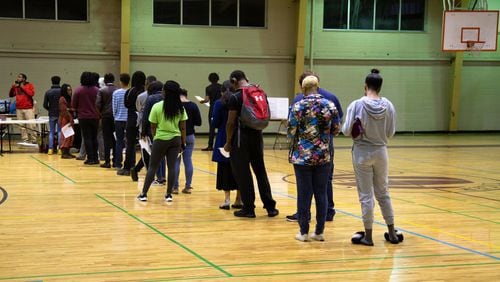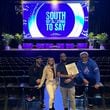More than 100 people attended the Fulton County election board’s meeting Thursday, armed with stories about Election Day snafus and concerns that thousands would be disenfranchised unless officials worked diligently to count every vote before certifying the election.
Some spoke of submitting absentee ballots, but not being able to see on the Secretary of State's voter page whether they had been accepted. Others were concerned that some of the 3,670 people who voted provisionally wouldn't have a chance to provide necessary identification, if required, to ensure their votes could be tallied. And there were more who worried that people who should have been able to vote were turned away.
“It’s a process of disenfranchisement by a thousand cuts,” said Susan Somach, an Atlanta resident who ran an election protection hotline Tuesday. “They need to take this very seriously.”
VIDEO: More on elections
One by one, voter advocates and residents came to the microphone to talk about the issues they saw on Election Day. Republican Secretary of State Brian Kemp has declared victory in the governor's race and resigned Thursday from his official duties as the state's chief election referee, while Stacey Abrams, the Democratic candidate, continues to push for every vote to be counted in the hopes of the race going to a runoff.
Voting rights advocates say Kemp’s action Thursday underscores their concerns all along about him overseeing an election in which he was competing.
“This is exactly the kind of situation we were trying to avoid,” said Nse Ufot with the New Georgia Project, an organization Abrams founded. “Declaring victory when every vote hasn’t been counted is absurd. The idea is that every vote counts. We don’t have a presumptive victor yet.”
In Fulton County, three polling places stayed open past 7 p.m. Tuesday night following a judge's order. In one, Pittman Park Recreation Center, too few machines were placed there in the morning. Richard Barron, the Fulton director of registration and elections, accepted responsibility for the error. Around 11 a.m., five more voting machines were sent to the precinct, bringing the total to eight.
At two other locations, Booker T. Washington High School and Archer Hall at Morehouse College, there were questions about an insufficient number of provisional ballots, and voters who had been turned away.
Jobie Crawford, a Spelman College sophomore, said she first went to Archer, then Booker T. Washington when she learned she was at the wrong polling place. At Booker T. Washington, a poll worker couldn’t find her name in the register, and told her that there were only two provisional ballots left. He asked how fair it would be if he gave her one of them, she said.
Crawford insisted the poll worker look for her name again, and once she found it on the rolls she was able to vote normally. She said she encouraged others to insist that they get provisional ballots.
“I can only imagine how many had the same experience and were turned away,” she said.
Crawford’s aunt, state Sen. Nikema Williams, D-Atlanta, said her niece’s experience was “unacceptable.”
“Atlanta is the cradle of the Civil Rights movement,” she said. “Are you telling all those people their votes don’t count?”
Vernetta Nuriddin, a member of the county’s elections board, said the story was too specific not to be believable. Barron said he would try to talk to that poll worker about what happened.
He said he was happy that people had come out to ask questions.
“We don’t learn things without participation,” he said. “It’s an educational process, in that regard.”








